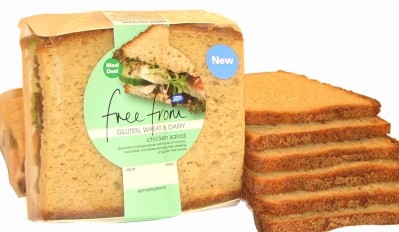Caterers need individually wrapped free-from foods

Michelle Berriedale-Johnson, who runs the UK’s Grocery Freefrom and Eating Out awards, said foodservice operators had to ensure consumers were provided with gluten-free and allergen-free foods, while minimising the cross-contamination risk.
From December 13, under the Food Information for Consumers Regulation, caterers will be required by law to inform customers about any of the 14 allergens on the EU’s list of those presenting the greatest risk in food.
“This is a big change for them,” claimed Berriedale-Johnson. “The biggest change is for the front of house stuff. The onus under the new regulation is on the front-of-house staff [to inform customers about allergens present in the food]. It’s extremely difficult and that is why foodservice has run scared of it.”
Many of the larger foodservice operators such as Sodexo have invested heavily in training their front of house staff to provide allergen information verbally. But for many smaller catering outlets, staff turnover is high and English is often not their first language, which increases the risk of errors occurring, warned Berriedale-Johnson.
Allergen cross-contamination
She added that many operators also ran the risk of other errors occurring – for example, when recipe formulations were changed and through accidental cross contamination – and these would remain. For those with serious diagnosed allergies, such as peanut allergies, this could potentially be fatal, should they suffer a major allergic reaction and go into anaphylactic shock.
“Allergens need to be treated as a food hygiene matter,” she claimed. However, the level of understanding in the sector was still relatively low, she added.
“Individually packed free-from products, heated and served in their packs is perfectly possible,” said Berriedale Johnson, but require some clever design to work for more up-market restaurants. She noted that 25% on entries in the foodservice category of this year’s FreeFrom awards, were such products.
To reduce the risk, increasing use would be made of protecting allergen free dishes against cross contamination up to the point for service at customers’ tables. Using protective, pre-packed foods that could be cooked and served in packs at the table offered one solution, she claimed.
Berriedale Johnson, who also runs the FreeFromMatters web site, will be chairing the FreeFrom Grocery and Foodservice Summit on September 10 and 11 in London, organised by the Food & Drink Innovation Network.
‘May contain’ labelling
Cross contamination with allergenic ingredients during manufacture is a huge concern for the food and drink industry, which often resorts to ‘may contain’ labelling to ensure due diligence against prosecution. However, most people with allergies tend to avoid foods labelled with ‘may contain’, viewing the risk of adverse consequences to be too high.
Following consumer pressure, soya processor Alpro has just reversed a decision to merge its soya and nut milk production and introduce ‘may contain’ labelling on products previously considered safe to eat by allergy sufferers.
Like many with an interest in free-from foods, Berriedale Johnson welcomed Alpro’s decision. “That has to be the way everyone goes … we are delighted.”
















